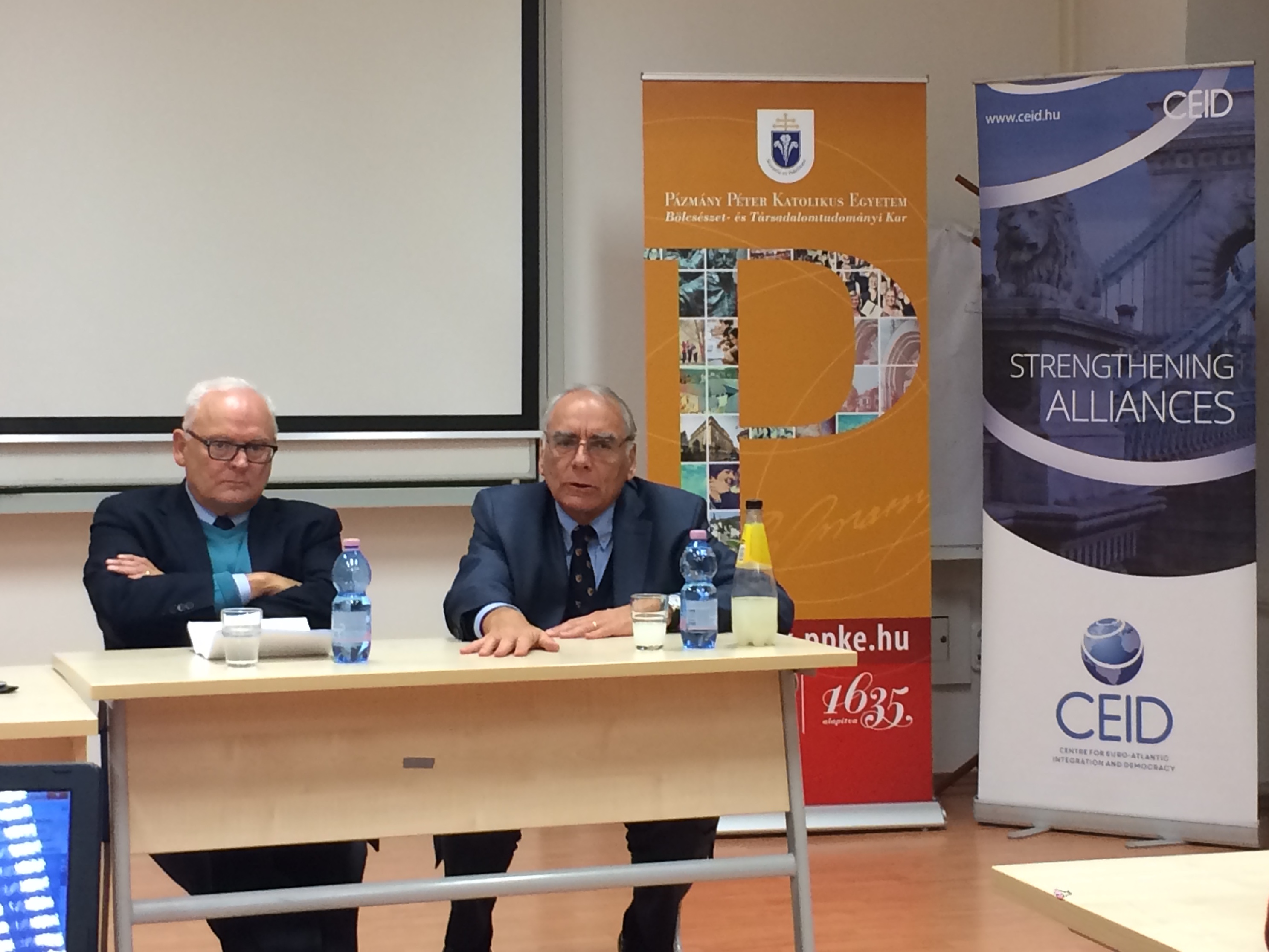
29 Sep The Trump Era: The Changing View of Europe in the United States- Event Summary
On September 21 st , the panel discussion was held on US-European relations under the administration Trump.
The panelists were Professor Stephen Szabo, Director of the Transatlantic Academy of the German Marshal Fund and Dr. Tibor Frank, Professor of History at the Department of American Studies at Eötvös Loránd University (ELTE), Budapest. The discussion was moderated by Ms. Edit Inotai, Senior Fellow of CEID.
The discussion was to determine the global impact of Trump administration and its implications for Europe. In addition, the panelists discussed who in the administration influence US foreign policy and how Trump’s personal traits led to unprecedented vacancies in key policy positions.
The discussion began by investigating how Europe fits into US global priorities under the Trump administration. Both panelists agreed that Europe is no longer the primary sphere of US foreign policy as other issues such as North Korea and Syria capture US public attention. However, Trump is not the only person responsible for this change in priorities. Professor Szabo noted that the Obama administration started the pivot towards Asia and stressed that issues such as the Ukraine crisis were regional European problems. Both panelists agreed that Trump administration is unlikely to prioritize Europe because of Trump’s “America First” message and its other negative stances on trade and human rights. Trump’s anti-globalist ideology was reconfirmed during recent speeches in Poland and Brussels where he criticized the EU and failed to reaffirm the Article Five of the NATO Treaty. Clearly, the Trump administration is not prioritizing traditional forms of US cooperation with Europe and will continue to be anti-globalist rhetoric developed by former advisers Steve Bannon and Sebastian Gorka.
The panelists then identified who in the administration are currently influencing foreign policy. Both agreed that few senior advisers in the administration have any foreign policy experience and it is doubtful that the president is listening to advisors such as his Secretary of State Rex Tillerson and Secretary of Defense James Mattis. Professor Szabo emphasized the unprecedented lack of cooperation between Trump and Tillerson. After the violence at a White Supremacist rally in Charlottesville, Virginia, Trump said that both sides were to blame and that not all attendees of the rally were white supremacists. During an interview with Fox News, Tillerson said Trump speaks for himself on this topic. Professor Szabo argued that this comment lead Trump to ostracize Tillerson and stop cooperating with him on international issues.
Professor Szabo discussed the promising appointment of Wess Mitchell as the State Department’s Undersecretary for Europe and Asia. Mitchell is an expert in Central Europe and understands the complexities of developing foreign policy; However, as he will directly report to Tillerson, this appointment will have a minimal impact on US policy. At this time, Trump does not appear to be listening to the State Department or other senior officials. Dr. Frank agreed that Trump is not interested in listening to experts and prefers appointing political allies to senior roles to provide support for his rhetoric. Both panelists concluded that two of the most important officials in the administration, Secretary Tillerson and Secretary Mattis, have severally limited influence over the President and US policy-making.
Trump’s popular base of 35 to 40% of US voters still support him despite his anti-globalist rhetoric and lack of foreign policy initiatives. The problem remains that anyone who contradicts the President’s messaging on either foreign or domestic policy will likely be fired or excluded. Trump took office eight months ago, yet the administration still lacks a clear foreign policy plan and its anti-globalist messaging continues to severely undermining transatlantic cooperation. It is still unclear who will take the leading roles in developing US foreign policy, if the President will heed their advice and how Europe will be affected.

